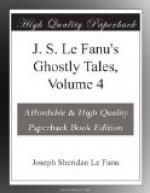And so looking about him, and every moment finding or fancying new food for wonder, he walked along the pavement, intending, without further delay, to make his way home.
But his adventures for the night were not concluded. He had nearly reached the angle of the short land that leads up to the church, when for the first time he perceived that an officer, in the uniform he had just seen, was walking before, only a few yards in advance of him.
The officer was walking along at an easy, swinging gait, and carried his sword under his arm, and was looking down on the pavement with an air of reverie.
In the very fact that he seemed unconscious of Peter’s presence, and disposed to keep his reflections to himself, there was something reassuring. Besides, the reader must please to remember that our hero had a quantum sufficit of good punch before his adventure commenced, and was thus fortified against those qualms and terrors under which, in a more reasonable state of mind, he might not impossibly have sunk.
The idea of the French invasion revived in full power in Peter’s fuddled imagination, as he pursued the nonchalant swagger of the officer.
“Be the powers iv Moll Kelly, I’ll ax him what it is,” said Peter, with a sudden accession of rashness. “He may tell me or not, as he plases, but he can’t be offinded, anyhow.”
With this reflection having inspired himself, Peter cleared his voice and began—
“Captain!” said he, “I ax your pardon, captain, an’ maybe you’d be so condescindin’ to my ignorance as to tell me, if it’s plasin’ to yer honour, whether your honour is not a Frinchman, if it’s plasin’ to you.”
This he asked, not thinking that, had it been as he suspected, not one word of his question in all probability would have been intelligible to the person he addressed. He was, however, understood, for the officer answered him in English, at the same time slackening his pace and moving a little to the side of the pathway, as if to invite his interrogator to take his place beside him.
“No; I am an Irishman,” he answered.
“I humbly thank your honour,” said Peter, drawing nearer—for the affability and the nativity of the officer encouraged him—“but maybe your honour is in the sarvice of the King of France?”
“I serve the same King as you do,” he answered, with a sorrowful significance which Peter did not comprehend at the time; and, interrogating in turn, he asked, “But what calls you forth at this hour of the day?”
“The day, your honour!—the night, you mane.”
“It was always our way to turn night into day, and we keep to it still,” remarked the soldier. “But, no matter, come up here to my house; I have a job for you, if you wish to earn some money easily. I live here.”
As he said this, he beckoned authoritatively to Peter, who followed almost mechanically at his heels, and they turned up a little lane near the old Roman Catholic chapel, at the end of which stood, in Peter’s time, the ruins of a tall, stone-built house.




